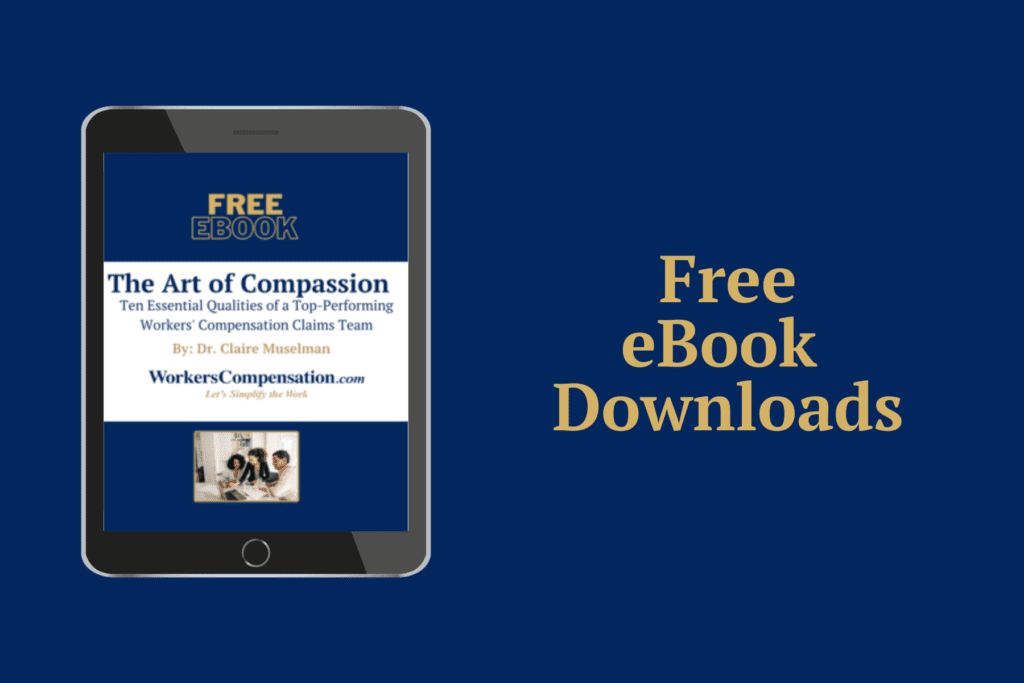Share This Article:

Sarasota, FL (WorkersCompensation.com) -- In workers' compensation, we often focus on injury's legal and financial aspects. However, the human element – the injured workers’ emotional and psychological well-being – is equally crucial. You will not find these words compliant with statutory bounds around them. Still, emotional well-being, psychological well-being, and empathy can drastically improve positive outcomes when organizations cultivate awareness and deploy actional behavior when assisting injured workers on their road to recovery.
Empathy, the ability to understand and share the feelings of another, stands at the heart of this human element. It is a moral imperative and a practical tool in facilitating recovery and fostering a supportive work environment. Before delving into its significance, it is essential to clarify what empathy is not, particularly in comparison to sympathy, as the two have been used interchangeably within this space.
Empathy vs. Sympathy: Understanding the Difference
Empathy is often confused with sympathy, yet they are distinctly different. Sympathy involves pity or sorrow for someone else's misfortune, constantly creating an emotional distance. It is more about 'feeling for' someone. In contrast, empathy is about 'feeling with' – it is a deeper, more personal connection where one vicariously experiences another person's emotions. In workers' compensation, this distinction is crucial. While sympathy might lead to a patronizing or detached approach, empathy fosters genuine understanding and partnership in recovery. Empathy can lead to more meaningful connections and better communication exchanges of information.
| Why Empathy Matters |
| Enhances Communication and Trust: Empathy allows better communication between injured workers, employers, and claims handlers. When individuals feel understood and supported, they are more likely to communicate openly about their challenges and needs. This openness is vital for effective case management and rehabilitation strategies. When there is a feeling of compassion, there is an enhanced feeling of providing open and honest experiences, rather than 'what should be happening' leading to a decrease in the fear of the unknown. Improves Recovery Outcomes: Emotional support can positively impact physical recovery. Empathetic interactions can reduce stress and anxiety, factors that are known to impede physical healing. Stress causes increased levels of cortisol, and with cortisol, there is inflammation. Tissue cannot heal when there is inflammation. If there are communication barriers that can be broken down to increase understanding and decrease fear, this is a win-win for the healing process from a physiological standpoint. Promotes a Positive Workplace Culture: Demonstrating empathy towards injured employees sets a precedent for a compassionate workplace culture. Organizational culture can enhance overall employee morale and loyalty, reducing turnover and fostering a sense of community. The feeling of belonging, like someone has a place, is necessary within the human spirit. The feeling of community is increasingly important when someone has sustained an injury, with even greater importance if they have been removed from their work environment and their people. |
| How to Practice Empathy in Workers' Compensation |
| Active Listening: Paying full attention to the injured worker, acknowledging their feelings, and thoughtfully responding can make a significant difference. Active listening includes avoiding interruptions and showing genuine interest in their concerns. Using language heard from the injured worker and seeking further information through clarifying questions can also help the informational transfer process. The system is hard to understand. Take time to listen to what is being said to help focus efforts on what needs to be done. Educating and Training Staff: Organizations should invest in training their staff to understand the importance of empathy. This training can include role-playing exercises, empathy workshops, and regular discussions on best practices. Empathy is a challenging skill for everyone and may take some work. Structuring discussions around this topic and consistently providing tips can enforce this skill set to become part of an organization's culture. Personalized Approach: Understand that each injury and individual is unique. Customizing communication and recovery plans based on the individual's specific situation and needs shows that their experience is valued and understood. By personalizing the approach, the injured worker can feel heard, which can reduce conflict and soft fraud throughout the recovery process. |
| What Empathy Looks Like in Practice |
| Case Studies and Success Stories: Sharing stories of successful recoveries where empathy played a key role can be inspiring. Highlighting instances where understanding and support made a difference in someone's recovery journey can serve as powerful examples. If you see something, say something. Share it if you are part of a claims team and see someone has a great outcome. Sharing empathic outcomes is not only limited to the claims process; the employer should focus on this element, too. Feedback Mechanisms: Implementing regular feedback systems where injured workers can share their experiences and suggestions can help in continually improving the empathetic approach. Holding up the mirror and seeing what is going on with their behavior and actions can be scary. Try to suspend judgment and consider this a learning experience. Imagine where we could be if we all started where we are now and looked for ways to improve. Start with a mirror approach to your organization to see what is going on to set a baseline. Support Beyond the Physical: Offering resources such as counseling services, support groups, or even simple gestures like sending a 'get well soon' card can be meaningful. Employers have a plethora of options at their fingertips. Work with human resources or find out what offerings are available to add resources to enhance the injured worker experience. Many benefits like this exist without people being well educated on the offerings or how to access such an Employee Assistance Program (EAP), which can include financial help, counseling, nutrition, and more. |
Empathy in the context of workers' compensation is about seeing beyond the injury and recognizing the whole person affected by it. Even more so, it extends beyond the entire person to the other members of their family, the community, and their work environment—the impact ripples. The workers' compensation industry and employers need to focus on fostering a supportive environment that not only aids in physical recovery but also addresses the emotional and psychological well-being of the injured worker. By implementing empathetic practices, organizations can improve recovery outcomes and build a more compassionate and loyal workforce.

Our free eBooks provide tips and strategies for better functioning workers' compensation teams and processes.
AI california case management case management focus claims compensability compliance courts covid do you know the rule emotions exclusive remedy florida FMLA glossary check Healthcare health care hr homeroom insurance insurers iowa leadership medical NCCI new jersey new york ohio osha pennsylvania roadmap Safety state info technology texas violence WDYT west virginia what do you think women's history women's history month workcompcollege workers' comp 101 workers' recovery Workplace Safety Workplace Violence
Read Also
- Apr 27, 2025
- Frank Ferreri
- Apr 27, 2025
- Chris Parker
About The Author
About The Author
-
Claire Muselman
Meet Dr. Claire C. Muselman, the Chief Operating Officer at WorkersCompensation.com, where she blends her vast academic insight and professional innovation with a uniquely positive energy. As the President of DCM, Dr. Muselman is renowned for her dynamic approach that reshapes and energizes the workers' compensation industry. Dr. Muselman's academic credentials are as remarkable as her professional achievements. Holding a Doctor of Education in Organizational Leadership from Grand Canyon University, she specializes in employee engagement, human behavior, and the science of leadership. Her diverse background in educational leadership, public policy, political science, and dance epitomizes a multifaceted approach to leadership and learning. At Drake University, Dr. Muselman excels as an Assistant Professor of Practice and Co-Director of the Master of Science in Leadership Program. Her passion for teaching and commitment to innovative pedagogy demonstrate her dedication to cultivating future leaders in management, leadership, and business strategy. In the industry, Dr. Muselman actively contributes as an Ambassador for the Alliance of Women in Workers’ Compensation and plays key roles in organizations such as Kids Chance of Iowa, WorkCompBlitz, and the Claims and Litigation Management Alliance, underscoring her leadership and advocacy in workers’ compensation. A highly sought-after speaker, Dr. Muselman inspires professionals with her engaging talks on leadership, self-development, and risk management. Her philosophy of empathetic and emotionally intelligent leadership is at the heart of her message, encouraging innovation and progressive change in the industry. "Empowerment is key to progress. By nurturing today's professionals with empathy and intelligence, we're crafting tomorrow's leaders." - Dr. Claire C. Muselman
More by This Author
Read More
- Apr 27, 2025
- Frank Ferreri
- Apr 27, 2025
- Chris Parker
- Apr 27, 2025
- Chris Parker
- Apr 25, 2025
- Liz Carey
- Apr 24, 2025
- Frank Ferreri




